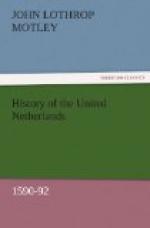The three bodies were afterwards gibbeted on the Greve in front of the Hotel de Ville, and exposed for two days to the insults and fury of the populace.
This was the culminating point of the reign of terror in Paris. Never had the sixteen tyrants; lords of the market halls, who governed the capital by favour of and in the name of the populace, seemed more omnipotent. As representatives or plenipotentiaries of Madam League they had laid the crown. at the feet of the King of Spain, hoping by still further drafts on his exchequer and his credulity to prolong indefinitely their own ignoble reign. The extreme democratic party, which had hitherto supported the House of Lorraine and had seemed to idolize that family in the person of the great Balafre, now believed themselves possessed of sufficient power to control the Duke of Mayenne and all his adherents. They sent the Jesuit Claude Mathieu with a special memorial to Philip II. That monarch was implored to take, the sceptre of France, and to reign over them, inasmuch as they most willingly threw themselves into his arms? They assured him that all reasonable people, and especially the Holy League, wished him to take the reins of Government, on condition of exterminating heresy throughout the kingdom by force of arms, of publishing the Council of Trent, and of establishing everywhere the Holy inquisition—an institution formidable only to the wicked and desirable for the good. It was suggested that Philip should not call himself any longer King of Spain nor adopt the title of King of France, but that he should proclaim himself the Great King, or make use of some similar designation, not indicating any specialty but importing universal dominion.
Should Philip, however, be disinclined himself to accept the monarchy, it was suggested that the young Duke of Guise, son of the first martyr of France, would be the most appropriate personage to be honoured with the hand of the legitimate Queen of France, the Infanta Clara Isabella.
But the Sixteen were reckoning without the Duke of Mayenne. That great personage, although an indifferent warrior and an utterly unprincipled and venal statesman, was by no means despicable as a fisherman in the troubled waters of revolution. He knew how to manage intrigues with both sides for his own benefit. Had he been a bachelor he might have obtained the Infanta and shared her prospective throne. Being encumbered with a wife he had no hope of becoming the son-in-law of Philip, and was determined that his nephew Guise should not enjoy a piece of good fortune denied to himself. The escape of the young duke from prison had been the signal for the outbreak of jealousies between uncle and nephew, which Parma and other agents had been instructed by their master to foster to the utmost. “They must be maintained in such disposition in regard to me,” he said, “that the one being ignorant of my relations to the other, both may without knowing it do my will.”




